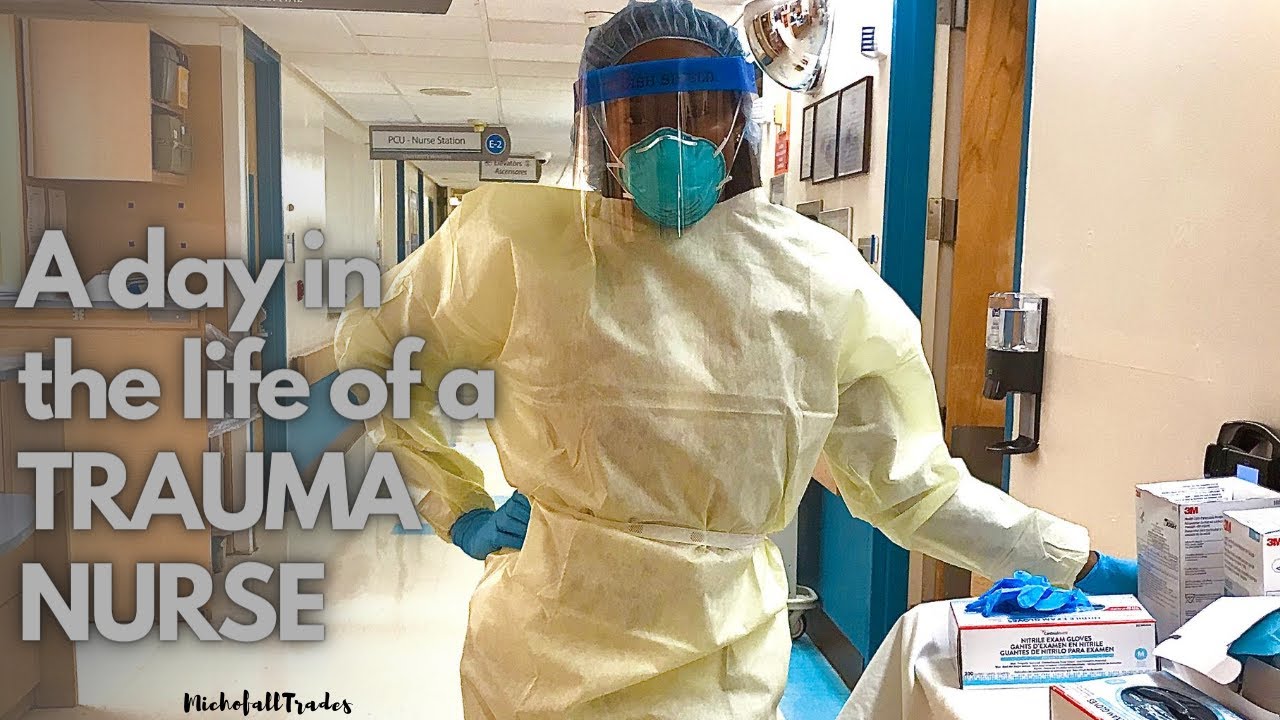Trauma Nurse - What Are Their Job Qualifications And Salary?
Trauma is the psychological reaction to a shocking or frightful event, such as an accident, a rape, or a natural disaster. Trauma nurse is always there to help people who have suffered from terrible traumas that have disrupted their daily lives. Trauma nurses are medical professionals who have been trained to evaluate, treat, and diagnose people who have had serious injuries or illnesses that could kill them.
Author:Suleman ShahReviewer:Han JuOct 05, 2022197.1K Shares2.6M Views

Trauma is the psychological reaction to a shocking or frightful event, such as an accident, a rape, or a natural disaster. Trauma nurseis always there to help people who have suffered from terrible traumas that have disrupted their daily lives. Trauma nurses are medical professionals who have been trained to evaluate, treat, and diagnose people who have had serious injuries or illnesses that could kill them.
Trauma Nurse - Their Functions And Statistics
Trauma nurses are people who thrive in high-pressure environments and urgent situations. Trauma nursing is a field that covers what nurses do and how they do it when caring for someone who has been traumatized.
The term "trauma nurse" is used to describe nurses who work in emergency rooms and other parts of hospitals where heavy incidents occur. Cases in which trauma nurses may be involved include:
- Accidents involving motor vehicles
- Assault
- Wounds from a gunshot
- Stabbed wounds
- Crush or penetrating injuries caused by the environment
- Injuries to the head
- Abuse or neglect, either physical or emotional
Trauma nurses usually take care of minor and intense problems, get patients ready for emergency surgeries, and help surgeons while they work. How to become a trauma nurse is similar to how to become a nurse in general, but a trauma nurse may need to get more education to be eligible for the job.
This type of nursing job is really difficult and requires a lot of hard work and focus. In the end, it's a very lucrative profession, but only if the nurse can deal with the pressure and expectations that come with the job.
If you're wondering how many trauma nurses there are in the United States, here's some data from statistic-related websites like Zippia, the expert career. According to the data, there are currently over 545,516 trauma nurses working in the United States.
Women make up 78.5% of all trauma nurses, while men make up 21.5%. An employed trauma nurse, on the other hand, is 44 years old on average.
Salary And Employment For Trauma Nurses
Payscale says that trauma nurses with a TNCC credential can make between $66,544 and $96,109 per year, depending on the job. Payscale is an American software and data company that helps employers manage employee pay and helps employees figure out how much they are worth in the job market.
This certification opens up a wide variety of career paths for nurses, including positions as a staff nurse, in an emergency room, as a nurse manager, director of nursing, or supervisor.
Salaries also depend on where you live and work, what other certifications or degrees you have, and where you work. Even though the Bureau of Labor Statistics doesn't have information about trauma nurses, in particular, it does have information about how the number of RNs is expected to grow by 16% by the year 2024. This rate is much faster than the average rate for all jobs.
Trauma Nursing Course Certified (TNCC) Jobs By Salary
| Registered Nurse (RN), Emergency Room | $55k - $106k ($79,114 average salary) |
| Nursing Manager | $75k - $130k ($96,680 average salary) |
| Director, Nursing | $73k - $151k ($98,522 average salary) |
| Registered Nurse (RN) | $50k - $101k ($72,594 average salary) |
| Clinical Nurse Manager | $71k - $123k ($89,738 average salary) |
| Registered Nurse (RN), Critical Care | $59k - $117k ($82,447 average salary) |
| Nurse Educator | $60k - $108k ($80,667 average salary) |
Trauma Nurse Requirements
You can pursue a variety of educational paths to become an RN and then specialize in trauma nursing. The following qualifications must be met in order to practice as a trauma nurse:
- Become licensed as a nurse by obtaining a nursing diploma through a hospital or educational program.This is a course program, not a degree program, that will get you ready for the NCLEX and award you a certification-eligible diploma.
- Acquire an Associate's Degree in Nursing (ADN).For those who want to become RNs, earning an associate's degree in nursing is a popular choice. With the help of this program, you can study for the NCLEX and become a registered nurse while earning an associate's degree.
- Finish the Bachelor of Sciencein Nursing (BSN) program. One of the best options for those looking to become registered nurses is a bachelor of science in nursing. A BSN program will improve your resume, get you ready for the NCLEX and RN certification exams, and make you a more appealing candidate, especially for hospitals aiming to be magnet-designated. A BSN can help you become more qualified and prepared for a specialty if you want to work in trauma and are already an RN.
What Is It Like To Be A Trauma Nurse?

VLOG| A day in the life of a trauma nurse.
People Also Ask
How To Become A Trauma Nurse?
Becoming a trauma nurse will depend on the rules for registered nurses in your state. But most states have about the same requirements for becoming a registered nurse and then a trauma nurse. Before anything else, you have to become a Registered Nurse (RN) first, and then you have to work in a trauma center to gain experience for a few years before you can be fully certified.
How Much Does A Trauma Nurse Make In A Year?
A trauma nurse's average salary is $83,260, according to PayScale. Certification can lead to higher pay.
What Does A Trauma Nurse Practitioner Do?
Trauma NPs, like other NPs, can conduct in-depth physical examinations, provide diagnoses, prescribe treatments, oversee recovery, and more. In the case of a patient brought in to the emergency room after a car accident, for instance, a trauma NP can quickly assess the situation, prescribe painkillers and imaging studies, and make a recommendation for the patient's next course of care.
Final Thoughts
A trauma nurse assists patients who have sustained an acute injury or illness, whether the cause was accidental, intentional, or unknown. Because these cases are unpredictable and frequently life-threatening, trauma nurses need to be able to process information quickly and accurately in unpredictable, chaotic situations. Trauma nurses need to be able to handle each case both emotionally and medically.
They also need to be skilled multitaskers who can talk to their colleagues while trying to stabilize the patient. Trauma nursing could be the right path for you if you want a fast-paced career in medicine where you'll learn to evaluate and treat a wide range of very serious cases.

Suleman Shah
Author
Suleman Shah is a researcher and freelance writer. As a researcher, he has worked with MNS University of Agriculture, Multan (Pakistan) and Texas A & M University (USA). He regularly writes science articles and blogs for science news website immersse.com and open access publishers OA Publishing London and Scientific Times. He loves to keep himself updated on scientific developments and convert these developments into everyday language to update the readers about the developments in the scientific era. His primary research focus is Plant sciences, and he contributed to this field by publishing his research in scientific journals and presenting his work at many Conferences.
Shah graduated from the University of Agriculture Faisalabad (Pakistan) and started his professional carrier with Jaffer Agro Services and later with the Agriculture Department of the Government of Pakistan. His research interest compelled and attracted him to proceed with his carrier in Plant sciences research. So, he started his Ph.D. in Soil Science at MNS University of Agriculture Multan (Pakistan). Later, he started working as a visiting scholar with Texas A&M University (USA).
Shah’s experience with big Open Excess publishers like Springers, Frontiers, MDPI, etc., testified to his belief in Open Access as a barrier-removing mechanism between researchers and the readers of their research. Shah believes that Open Access is revolutionizing the publication process and benefitting research in all fields.

Han Ju
Reviewer
Hello! I'm Han Ju, the heart behind World Wide Journals. My life is a unique tapestry woven from the threads of news, spirituality, and science, enriched by melodies from my guitar. Raised amidst tales of the ancient and the arcane, I developed a keen eye for the stories that truly matter. Through my work, I seek to bridge the seen with the unseen, marrying the rigor of science with the depth of spirituality.
Each article at World Wide Journals is a piece of this ongoing quest, blending analysis with personal reflection. Whether exploring quantum frontiers or strumming chords under the stars, my aim is to inspire and provoke thought, inviting you into a world where every discovery is a note in the grand symphony of existence.
Welcome aboard this journey of insight and exploration, where curiosity leads and music guides.
Latest Articles
Popular Articles